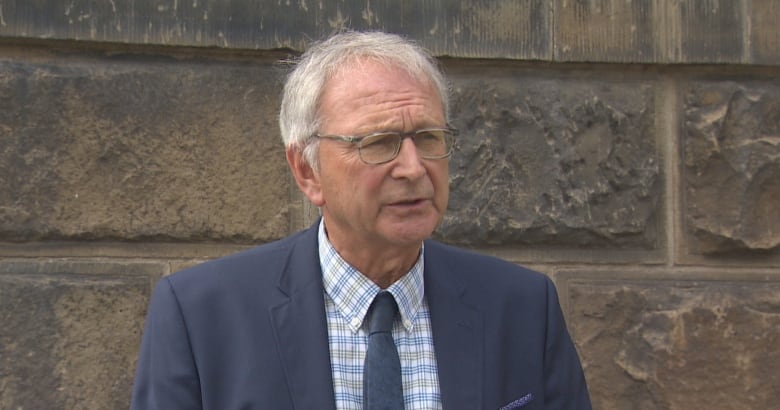New Brunswick
Province leaves bargaining table as strike votes loom for thousands of public-sector workers
Higgs says CUPE 'chose not to' have meaningful discussion, CUPE says province 'refused' to respond to proposal

By next week, more than 22,000 workers from 10 locals of the Canadian Union of Public Employees expect to hold strike votes.
And if deals aren't signed, they could be walking off the job before the end of September.
"It would have quite a serious impact on the province. It would basically, after a number of days, shut the province down," said CUPE New Brunswick president Steve Drost.
"If these groups decide to pull their services … it would have quite a detrimental impact on the province."
Workers in 10 locals without contracts
The 10 union locals include workers in the health care, education, transportation and agricultural sectors, as well as social workers, jail guards, court stenographers, and staff at Worksafe NB, the New Brunswick Community Colleges and N.B. Liquor.
All have been without contracts since between 2016 and 2019.
"These workers never wanted to take strike action, but they feel they've been backed into a corner," Drost said.
Earlier this year, CUPE gave the province 100 days to reach agreements. That deadline expires Sept. 7.
Union and government bargaining teams have been in separate meeting rooms in a Fredericton hotel since Tuesday, passing proposals back and forth.
On Friday morning, the province left the bargaining table, CUPE said in an email to reporters.
The union said government negotiators "refused to respond" to a proposal it delivered Thursday night and did not want to negotiate unless CUPE agreed to concessions.
In a statement, Higgs said CUPE had refused to budge from a demand for five-per-cent annual wage increases over four years "and was planning strike votes for next week while we were at the table this week.
"The union had the opportunity to engage in meaningful negotiations but chose not to on all subjects, which is very disappointing," he said.
Higgs said the union's demand would have cost $158 million, while the province's latest counter-offer would have cost $71 million.

Pandemic put pressure on finances: Higgs
Last December, Higgs said he would ask public-sector unions to agree to four-year contracts with no wage increase in one year and one-per-cent wage increases in each of the three remaining years.
He said wage restraint was necessary because COVID-19 had pushed the province into a precarious financial position.
This year's provincial budget projected a deficit of $244.8 million. The government had planned to release its first-quarter financial update on Thursday but that was later postponed.
Drost said years of wage increases below the pace of the cost of living have forced many public employees to take on second jobs or leave their jobs altogether. Others can't keep up with rents that are rising far faster than their salaries, he said.
Centralized wage negotiation process requested
In August, Higgs asked the CUPE locals to agree to a centralized wage negotiation process. All 10 locals are in talks with provincial negotiators to try to reach a single wage template for all their collective agreements.
If that happens, they'd then finalize the other non-wage terms of each contract individually.
Drost said last week the province proposed a new six-year wage package with one-per-cent increases in each of the first four years followed by two-per-cent increases in the fifth and sixth years.
He said that was "quite an insult" because it was identical to the package recently rejected by the New Brunswick Nurses Union.
Higgs said Friday that the province had made a new offer of annual increases of 1.25 per cent over four years and then two per cent in the fifth and sixth years.
But in return he wanted CUPE to agree to concessions, including converting members' pensions to the shared-risk model used elsewhere in the civil service and transferring about 100 union members to management positions.
The statement also said the province offered an extra 2.5 per cent wage increase if members agreed to give up a retirement allowance that now exists.
The premier's statement says contingency plans are in place if union locals opt to strike.
No comments:
Post a Comment